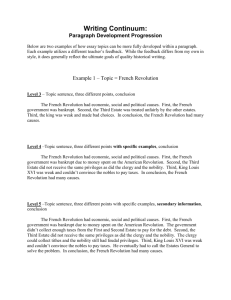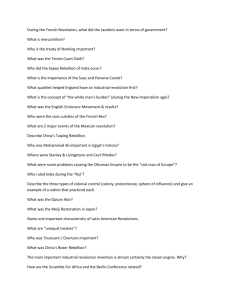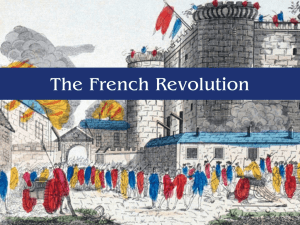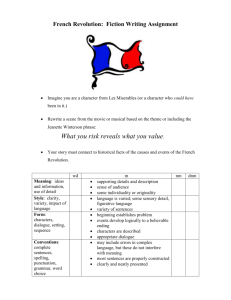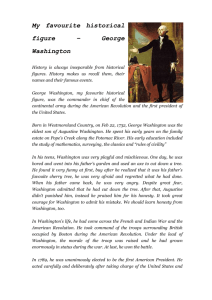Writing Progression
advertisement
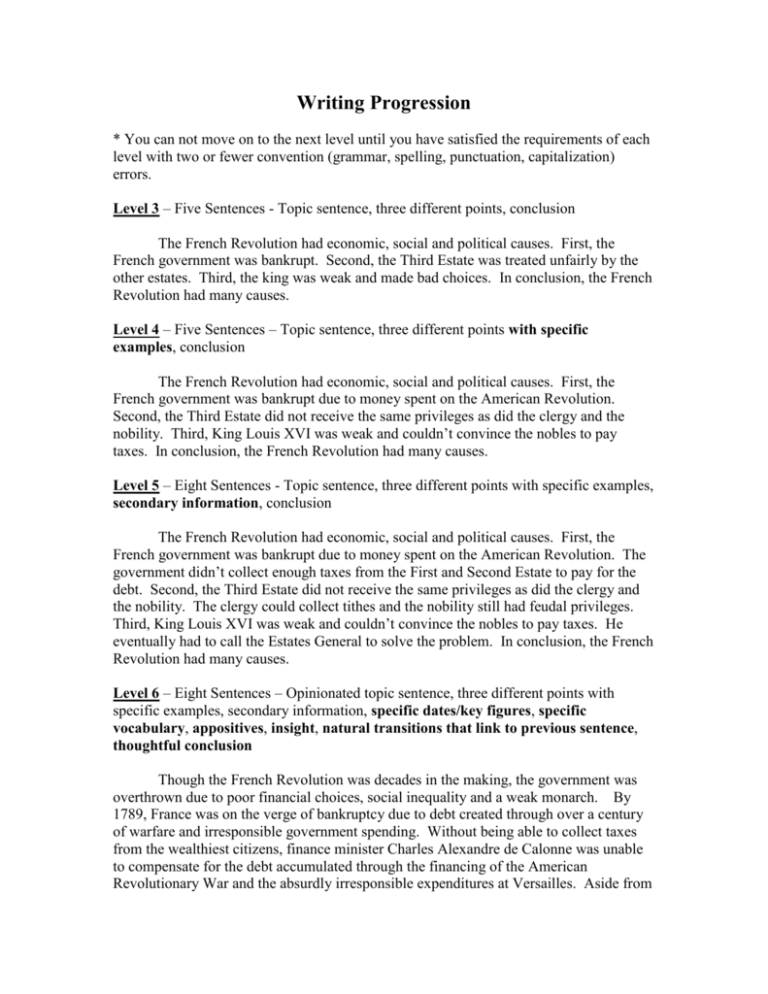
Writing Progression * You can not move on to the next level until you have satisfied the requirements of each level with two or fewer convention (grammar, spelling, punctuation, capitalization) errors. Level 3 – Five Sentences - Topic sentence, three different points, conclusion The French Revolution had economic, social and political causes. First, the French government was bankrupt. Second, the Third Estate was treated unfairly by the other estates. Third, the king was weak and made bad choices. In conclusion, the French Revolution had many causes. Level 4 – Five Sentences – Topic sentence, three different points with specific examples, conclusion The French Revolution had economic, social and political causes. First, the French government was bankrupt due to money spent on the American Revolution. Second, the Third Estate did not receive the same privileges as did the clergy and the nobility. Third, King Louis XVI was weak and couldn’t convince the nobles to pay taxes. In conclusion, the French Revolution had many causes. Level 5 – Eight Sentences - Topic sentence, three different points with specific examples, secondary information, conclusion The French Revolution had economic, social and political causes. First, the French government was bankrupt due to money spent on the American Revolution. The government didn’t collect enough taxes from the First and Second Estate to pay for the debt. Second, the Third Estate did not receive the same privileges as did the clergy and the nobility. The clergy could collect tithes and the nobility still had feudal privileges. Third, King Louis XVI was weak and couldn’t convince the nobles to pay taxes. He eventually had to call the Estates General to solve the problem. In conclusion, the French Revolution had many causes. Level 6 – Eight Sentences – Opinionated topic sentence, three different points with specific examples, secondary information, specific dates/key figures, specific vocabulary, appositives, insight, natural transitions that link to previous sentence, thoughtful conclusion Though the French Revolution was decades in the making, the government was overthrown due to poor financial choices, social inequality and a weak monarch. By 1789, France was on the verge of bankruptcy due to debt created through over a century of warfare and irresponsible government spending. Without being able to collect taxes from the wealthiest citizens, finance minister Charles Alexandre de Calonne was unable to compensate for the debt accumulated through the financing of the American Revolutionary War and the absurdly irresponsible expenditures at Versailles. Aside from the financial dilemma, many French citizens demanded social equity. Spurred on by the notions of equality contributed by philosophes such as John Locke and Jean-Jacques Rousseau, the wealthy members of the Third Estate joined with the peasants to demand change. Choices made by Louis XVI made this change possible. After failing to gain support from the nobility in his attempt to expand taxation, the king ill-advisedly gathered the most prominent voices in Paris, a step that eventually led to his downfall. With the key members assembled and a host of complaints being tossed around the city streets, Paris was ripe for rebellion and rebellion they would get. Level 7 – Undetermined Quantity of Sentences – Opinionated topic sentence, three different points with specific examples, secondary information, specific dates/key figures, primary source evidence, manipulating key primary source information so that it is weaved into own words through ellipses and/or brackets, specific vocabulary, appositives, natural transitions that link to previous sentence, thoughtful conclusion Though the French Revolution was decades in the making, the government was overthrown due to poor financial choices, social inequality and a weak monarch. By 1789, France was on the verge of bankruptcy due to debt created through over a century of warfare and irresponsible government spending. Without being able to collect taxes from the wealthiest citizens, finance minister Charles Alexandre de Calonne was unable to compensate for the debt accumulated through the financing of the American Revolutionary War and the absurdly irresponsible expenditures at Versailles. By 1787, visiting Englishman Arthur Young even wondered if the “confusion in the finances” could lead to “a total overthrow of the government”. Aside from the financial dilemma, many French citizens demanded social equity. Spurred on by the notions of equality contributed by philosophes such as John Locke and Jean-Jacques Rousseau, the representatives of the peasants and the wealthy members of the Third Estate united to demand change. Eventually, these demands would be seen in the Declaration of the Rights of Man that stated that because “men were born free and equal in rights” they should be able to “speak, write and print freely” as well as “being equal in [the laws] eyes.” Choices made by Louis XVI made this transformation possible. After failing to gain support from the nobility in his attempt to expand taxation, the king ill-advisedly gathered in Paris the most prominent voices from around France, a step that eventually led to his downfall. With the key members assembled and a host of complaints being tossed around the city streets, Paris was ripe for rebellion and rebellion they would get. Grade Distribution: Level 3: 65% Level 4: 75% Level 5: 85% Level 6: 92% Level 7: 100%
